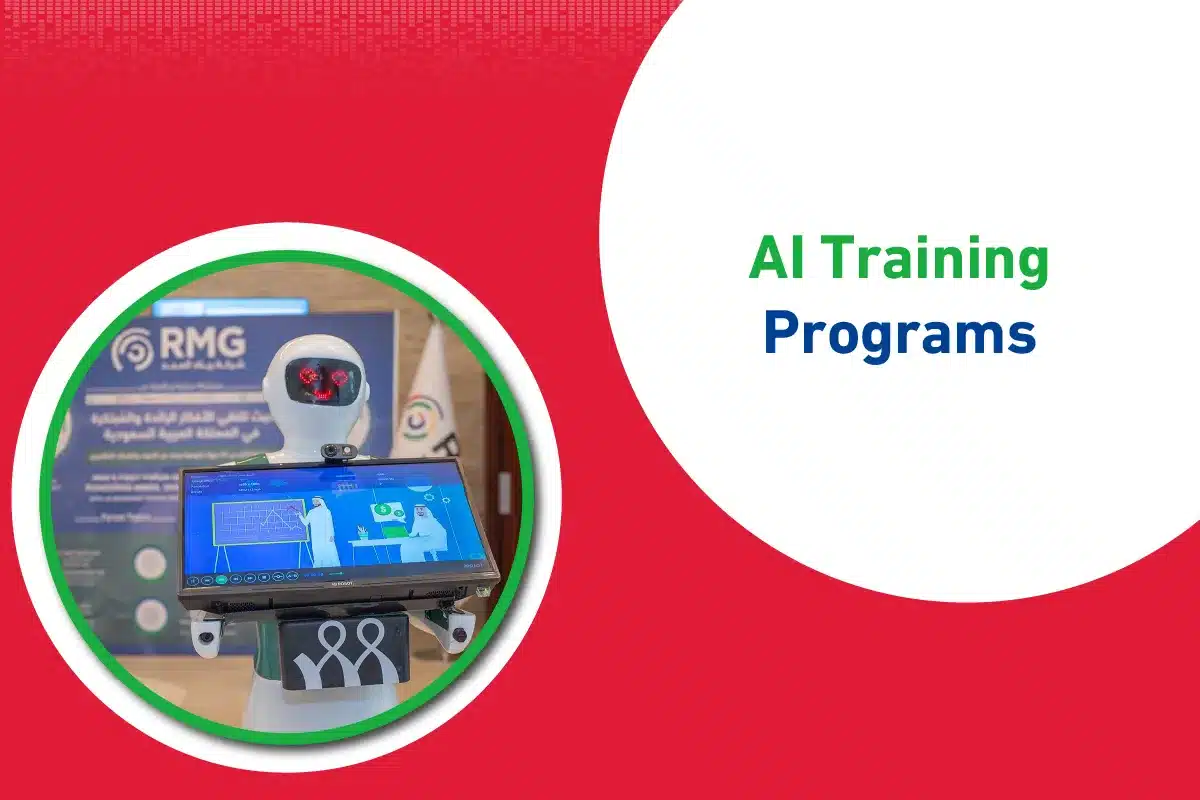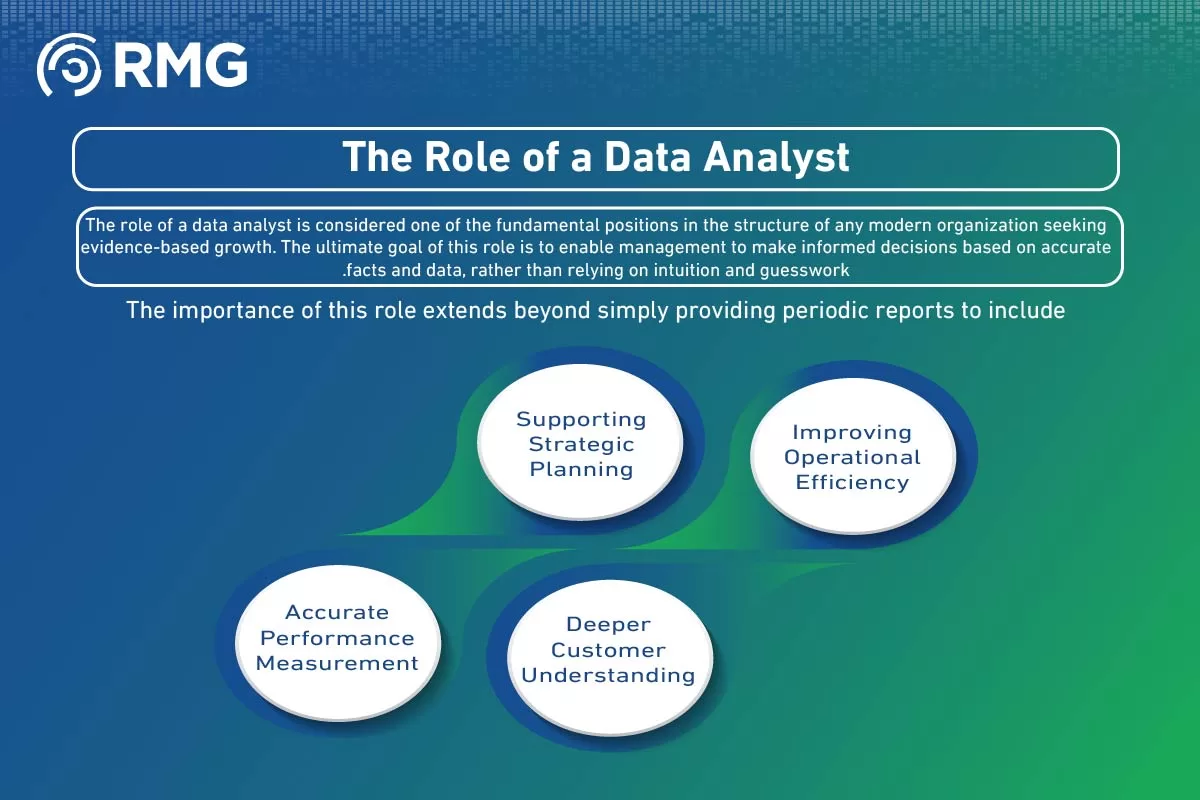Blog Body
Do you dream of becoming a professional data analyst? Discover with us everything about this pivotal role in the business world, from essential tasks and skills to the roadmap for starting your career. Join Renad Al Majd and get accredited certificates that open doors to your future.
In an era where data has become the new oil, companies and institutions of all sizes and specializations are racing to leverage the informational treasures they possess. However, this raw data remains just silent numbers and characters unless someone deciphers it and transforms it into actionable strategic insights. This is where the crucial and indispensable role of a Data Analyst emerges; the mastermind who turns digital chaos into real growth opportunities.
The ability to understand and interpret data is no longer a competitive advantage, but a fundamental necessity for survival and prosperity in the modern job market. Through this comprehensive article, we will take you on a deep exploratory journey into the world of data analysis, to understand together what this job entails, its importance, the necessary skills for success, and how you can begin your promising career to become a sought-after data analyst in major companies.
Who is a Data Analyst?
Simply put, a data analyst is the bridge that connects large and complex data with decision-makers in an organization. They are the professional who possesses the technical and analytical skills to collect, clean, and analyze data, then transform the results into a clear and understandable story that helps management understand business performance, identify future trends, discover hidden problems, and seize new opportunities.
A data analyst can be compared to a translator who translates the complex language of numbers into a simple business language that everyone can understand and benefit from. They don’t just present abstract numbers; they provide answers to vital questions such as: “Why did our sales decrease in the last quarter?”, “What are the demographic characteristics of our most loyal customers?”, or “What is the return on investment of our latest marketing campaign?”.
The Role of a Data Analyst
The role of a data analyst is considered one of the fundamental positions in the structure of any modern organization seeking evidence-based growth. The ultimate goal of this role is to enable management to make informed decisions based on accurate facts and data, rather than relying on intuition and guesswork.
The importance of this role extends beyond simply providing periodic reports to include:
- Improving Operational Efficiency: By analyzing operational data, data analysts can identify weaknesses and waste points and propose solutions to increase productivity and reduce costs.
- Supporting Strategic Planning: Data analytics provides deep insights into the market, competitors, and customer behavior, which helps in developing more realistic and effective long-term strategies.
- Deeper Customer Understanding: Analyzing customer data helps companies tailor their products, services, and marketing campaigns to better meet their needs, increasing their satisfaction and loyalty.
- Accurate Performance Measurement: Data analysts design and track Key Performance Indicators (KPIs) that reflect the company’s health and its achievement of objectives.
What Does a Data Analyst Do?
The daily tasks of a data analyst vary but generally revolve around the data lifecycle. Their main tasks can be summarized as follows:
- Defining Objectives and Collecting Data: Collaborating with different departments (e.g., marketing, sales, and finance), the data analyst identifies the questions that need answers, then works on collecting the necessary data from multiple sources, whether internal databases (such as CRM and ERP systems) or external sources.
- Cleaning and Organizing Data: Raw data is often incomplete or contains errors and duplications. The data analyst cleans this data (Data Cleaning) and prepares it for the analysis process, a crucial step to ensure the accuracy of the results.
- Analyzing Data and Extracting Patterns: Using statistical and software tools, the analyst explores the data to search for patterns, trends, and correlations that may not be obvious at first glance.
- Interpreting Results and Providing Insights: This is the stage where numbers are transformed into knowledge. The analyst interprets what the results mean in the context of business objectives and extracts actionable insights.
- Presenting Data and Reporting: Data analysts use Data Visualization tools such as interactive charts and tables to create appealing and easy-to-understand reports and Dashboards, and present them to stakeholders in a convincing manner.
What is Data Analysis Skill?
Data analysis skill is a systematic process of examining data sets to draw useful conclusions about the information they contain. It is a unique blend of science and art; it relies on scientific foundations from statistics, mathematics, and computer science, but it also requires the art of intellectual curiosity and the ability to tell stories through numbers. This skill is not just about the ability to use a specific software tool, but rather a complete mindset and methodology of thinking.
Key Data Analysis Skills
To be a successful data analyst, you need a comprehensive set of Hard Skills and Soft Skills.
First: Hard Skills:
- Statistics and Mathematics: A strong understanding of basic statistical concepts such as averages, standard deviations, and hypothesis testing.
- Structured Query Language (SQL): This is the standard language for interacting with databases. Proficiency in SQL is essential for extracting and manipulating data.
- Advanced Excel: Excel remains a powerful and widely used tool for quick data analysis and visualization.
- Programming Languages (Python or R): Python (with libraries like Pandas and NumPy) and R are powerful programming languages for complex data analysis and building statistical models.
- Data Visualization Tools: The ability to use tools like Tableau or Power BI to transform data into interactive and compelling visualizations.
Second: Soft Skills:
- Critical Thinking: The ability to ask the right questions, challenge assumptions, and evaluate data quality.
- Problem-Solving Skills: Viewing business problems as data problems that can be solved through analysis.
- Communication Skills: The ability to explain complex technical results to a non-technical audience in a clear and concise manner.
- Accuracy and Attention to Detail: A small error in data or analysis can lead to completely wrong conclusions.
How to Develop and Maintain Business Analysis Skills
The world of data is evolving rapidly, so continuous learning is key to success. Here are some effective ways to develop your skills:
- Enroll in Specialized Training Courses: Look for training programs that provide a structured curriculum covering theoretical and practical aspects.
- Work on Real Projects: Apply what you’ve learned to real-world datasets. You can find them on websites like Kaggle or GitHub. Building a strong Portfolio is the best way to demonstrate your abilities.
- Read and Follow Experts: Follow blogs, articles, and books specialized in the data field to stay updated on the latest tools and techniques.
- Obtain Accredited Certifications: Certifications increase your credibility and prove to employers that you possess the required skills.
How to Become a Data Analyst?
If you aspire to enter this exciting field, here is a suggested roadmap:
- Build Foundational Knowledge: Make sure you have a good understanding of mathematics, statistics, and business logic.
- Learn Essential Tools: Start by mastering Excel then move on to learning SQL, as it is the most in-demand skill in the job market.
- Choose a Programming Language: Decide whether you will learn Python or R and focus on mastering one of them initially.
- Master Visualization Tools: Learn to use Tableau or Power BI, as they are the leading tools in the market.
- Build Your Portfolio: Execute 3-4 comprehensive analytical projects from start to finish and present them professionally.
- Obtain a Professional Certification: Join an accredited training program that grants you a certificate to enrich your resume.
Start Your Data Learning Journey with Renad Al Majd
At Renad Al Majd, we understand that the journey to becoming a data analyst can seem long and complex. That’s why we have designed comprehensive and intensive training programs to be your gateway to entering this world with confidence and strength. Our programs are designed by industry experts and focus on equipping you with the practical skills that employers are looking for today, with real-world applications and practical projects that ensure you gain real experience.
Learn Business and Data Analysis with Accredited Certifications
Investing in your education is the best investment in your future. With Renad Al Majd, you will not only receive high-quality training, but you will also get accredited certifications that are highly valued in the job market. These certifications are tangible proof of your mastery of essential data analysis skills and tools, giving you a strong competitive advantage when applying for jobs, and opening wide doors for career advancement and increased income.
Contact Renad Al Majd Company
Are you ready to take the first step towards a career full of opportunities and challenges? Do you want to transform your passion for numbers into a successful career? Our team at Renad Al Majd is ready to help you.
Contact us today to learn more about our data and business analysis training courses, get the necessary consultations to discuss your career goals, and let us be your partner on your journey to success. Your future as a professional data analyst starts here.





















